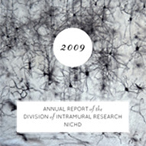New Intramural Report Available
The Division’s research programs address topics ranging from molecular and cellular biology, genetics, and endocrine and genetic disorders, to physical biology, neurosciences, immunology, reproduction, and behavioral research. Its projects are organized around the theme of the orchestration of life by molecular messengers.


 BACK TO TOP
BACK TO TOP